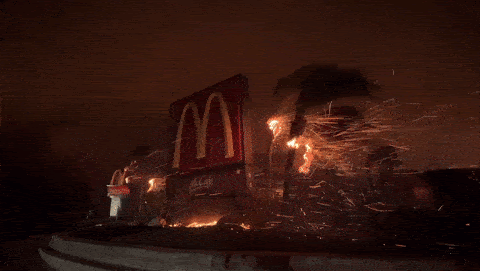TCC #48: Blame games in a world on fire
Fire, fury, and finger-pointing
Los Angeles is on fire. The footage coming out of the city is like something out of a disaster movie: hurricane-force winds whipping fire into fast-moving, apocalyptic infernos. In January!
It’s chaos. It’s destruction. It’s climate breakdown!
No, the “root cause” of these fires isn’t climate change.
Drought and extreme heat can’t start fires on their own.
But they can make ignition more likely.
Sure, climate change doesn’t start fires. But it does bring us:
Longer fire seasons
More days at risk of fires
Conditions that are more conducive to fires that are bigger, hotter, and more destructive
But what’s more surreal than the fires themselves is the cultural response.
(If you can call it that. I’ve said it before, and I’ll say it again: the culture, here in the U.S. at least, is broken.)
Instead of grappling with the stark realities of a warming planet, some of the loudest voices have decided that the real culprit is… diversity. An endangered fish. A magical faucet in Canada that California democrats simply refuse to turn on.
It’s like we’re watching a live-action version of a conspiracy forum.
And while it’s easy to roll our eyes at the absurdity of these claims, they highlight something critical: the human need to deflect, distract, and deny in the face of an overwhelming crisis.
You’d think we could all agree on the obvious problem: extreme weather, fueled by climate change, colliding with an overburdened and underprepared system.
But instead, the blame game has spiraled into the theater of the absurd.

Such responses reflect a deeply ingrained refusal to confront the systemic causes of our crises. Blaming diversity initiatives and fictional faucets allows people to sidestep the uncomfortable truth: our planet is burning, and we’re failing to act.
What it all says about us
Deflection in the face of climate breakdown isn’t new. Consider this excerpt from George Marshall’s Don’t Even Think About It: Why Our Brains Are Wired to Ignore Climate Change:
“When I suggested to Long that she might band together with the leaders of other affected communities and demand federal action on climate change, she rolled her eyes. ‘Have you seen what Sandy did?” she demanded. “Climate change, duh, of course it is happening. But it is bigger than anything we could make a difference on. We just want to go home, and we will deal with all that lofty stuff some other day.”
Feel familiar?
This is the paradox of climate communication. (Most) people know the crisis is real. They see the devastation, the floods, and the fires. But acknowledging its scale — and our collective failure to address it — feels insurmountable. So instead of action, we get indifference. Or worse, blame games that distract from solutions.
It’s easier to blame ‘woke policies’ than to ask why we’ve allowed corporations to profit from climate destruction for decades. It’s easier to vilify the ‘other’ than to question why we’ve prioritized short-term economic gain over long-term survival.
This instinct to scapegoat isn’t just frustrating — it’s dangerous. It keeps us stuck in a cycle of denial and inaction, even as the not-so-metaphorical flames creep closer.
If we’re going to communicate effectively about the climate crisis, we need to understand this psychological resistance. More importantly, we need to find ways to break through it.
What it all means for climate communicators
What does all of this absurdity mean for those of us trying to communicate about the climate crisis? A lot, actually.
The first lesson is this: people are overwhelmed. They see firestorms in Los Angeles, hurricanes in Florida, floods in France, and record heatwaves in Europe. But they can’t care about everything, all of the time. The scale of the problem — and the lack of clear, actionable solutions — makes them shut down. In that void, blame and misinformation thrive.
For climate communicators, it’s clear we need to shift our approach. We can’t just talk about the severity of crisis after crisis. We need to offer stories of positive progress. Solutions that feel tangible, and within reach.
The second lesson is that absurdity gets attention. As wild and misguided as some of the reactions to the LA wildfires have been, they’ve somehow managed to dominate more than their fair share of the conversation. Why?
Because in a world where we’re inundated with clickbait, only the loudest — or strangest — messages break through.
This doesn’t mean we should resort to shock tactics or misinformation. But it does mean we have work to do. And we need to get creative about it! Movies like Don’t Look Up and other comedic commentary on climate work spark conversations and engage audiences in ways traditional messaging often can’t. Humor works because it disarms people; it makes them pay attention without feeling overwhelmed or preached to.
Moving beyond the noise
The blame games, deflection, and far-out responses to the LA wildfires are… alarming. But this challenge is not insurmountable. We can push past the noise and guide the conversation back to what matters.
As Bernie Sanders tells us (Amelia will confirm that I am a proud Bernie-bro):
“We can discuss how urban and rural areas can best respond to climate change and mitigate damage, but this existential crisis will only get worse in the U.S. and globally unless we break our addiction to fossil fuels and lower carbon emissions."
Couldn’t have said it better myself.


